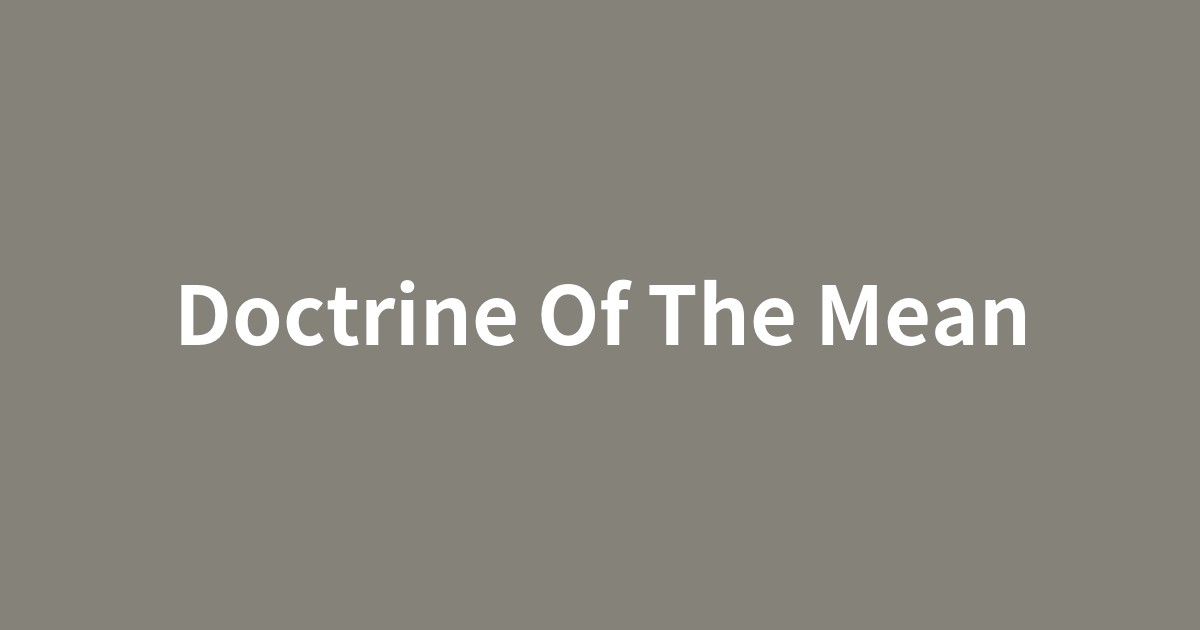このページは、歴史や文化の物語を楽しみながら、その文脈の中で重要な英単語を自然に学ぶための学習コンテンツです。各セクションの下にあるボタンで、いつでも日本語と英語を切り替えることができます。背景知識を日本語で学んだ後、英語の本文を読むことで、より深い理解と語彙力の向上を目指します。

偏ることなく、常に中正であること。儒教の四書の一つ『中庸』が説く、感情と行動のmoderation(中庸)と、宇宙とのharmony(調和)。
この記事で抑えるべきポイント
- ✓『中庸』は儒教の核心的な経典「四書」の一つであり、孔子の思想を継承し、より形而上学的に深化させた重要な文献であると位置づけられています。
- ✓「中庸」の真意は、単なる中間や妥協ではなく、時と状況に応じて最も適切で偏りのない一点(時中)を見出す動的な知恵であり、感情のコントロールと密接に関連しています。
- ✓この哲学は、個人の心の平穏(修身)から社会全体の調和(治国平天下)に至るまで、あらゆるレベルでの安定を目指す普遍的な指針として、現代にも応用できる可能性を秘めています。
『中庸』の徳 ― バランスと調和の哲学
SNSでの炎上、政治的な対立、二元論的な意見のぶつかり合い。現代社会は、様々な「極端」で溢れています。このような時代だからこそ、2000年以上も前に説かれた「偏らない」生き方の哲学、『中庸』が私たちに新鮮な示唆を与えてくれるかもしれません。この記事では、儒教の根本思想である『中庸』が説くバランスと調和の哲学を探求し、現代を生きる私たちのためのヒントを探ります。
The Virtue of the Doctrine of the Mean — A Philosophy of Balance and Harmony
Social media flame wars, political polarization, and the clash of binary opinions. Modern society is overflowing with various forms of "extremes." It is precisely in such an era that the philosophy of a "non-biased" way of life, the Doctrine of the Mean, which was taught over 2,000 years ago, may offer us fresh insights. In this article, we will explore the philosophy of balance and harmony taught by the Doctrine of the Mean, a fundamental ideology of Confucianism, and search for hints for us living in the modern world.
『中庸』とは何か? ― 四書に数えられる儒教の叡智
まず、『中庸』がどのような書物なのか、その位置づけから見ていきましょう。『中庸』は、儒教(Confucianism)における最重要経典群「四書」(『大学』『中庸』『論語』『孟子』)の一つに数えられています。伝統的に、孔子の孫である子思(しし)の作と伝えられており、孔子の教えをより深く、体系的に掘り下げた内容となっています。単なる道徳訓に留まらず、人間と世界のあり方を問う形而上学的な次元にまで思索を深めている点に、この書の大きな特徴があります。それは、生き方を探求する壮大な哲学(philosophy)体系なのです。
What is the Doctrine of the Mean? — The Wisdom of Confucianism Counted Among the Four Books
First, let's look at what kind of text the Doctrine of the Mean is and its position. The Doctrine of the Mean is considered one of the most important scriptures in Confucianism, the "Four Books" (The Great Learning, The Doctrine of the Mean, The Analects, and The Mencius). Traditionally, it is attributed to Zisi, the grandson of Confucius, and its content delves deeper and more systematically into Confucius's teachings. A major feature of this book is that it goes beyond mere moral precepts to deepen its contemplation to a metaphysical level, questioning the nature of humanity and the world. It is a grand philosophy system that explores how to live.
「真ん中」ではない? ― moderationの本当の意味
「中庸」と聞くと、多くの人が「AとBの意見の中間を取る」「足して二で割る」といった、一種の妥協や事なかれ主義をイメージするかもしれません。しかし、本来の『中庸』が説くのは、そのような静的な「真ん中」ではありません。書物によれば、喜怒哀楽といった感情(emotion)がまだ心の中に現れていない状態を「中」と呼び、これが全ての出発点とされます。そして、感情が現れたとしても、それが節度を保ち、行き過ぎない状態を「和」と呼びます。『中庸』が目指すのは、この「中」と「和」を時と状況に応じて見極め、常に最適なバランス(balance)を保ち続ける動的な知恵なのです。この偏りのない状態こそが、中庸(moderation)の真髄と言えるでしょう。
Not Just the "Middle"? — The True Meaning of Moderation
When people hear "Doctrine of the Mean," many might imagine a kind of compromise or passive approach, like taking the middle ground between opinions A and B or "adding them up and dividing by two." However, what the original Doctrine of the Mean teaches is not such a static "middle." According to the text, the state before feelings like joy, anger, sorrow, and pleasure—our emotion—arise in the heart is called "Zhong" (the mean), and this is the starting point of everything. Then, even when emotions do arise, the state in which they remain moderate and do not go to excess is called "He" (harmony). The goal of the Doctrine of the Mean is the dynamic wisdom of discerning this "Zhong" and "He" according to time and circumstance, and constantly maintaining the optimal balance. This unbiased state is the true essence of moderation.
天と繋がる道 ― harmonyがもたらすもの
『中庸』の思想は、個人の心の平穏だけに留まりません。その射程は、家庭、社会、国家、そしてついには宇宙(universe)全体にまで及びます。まず、個人が内面的な修養によって最高の徳(virtue)を身につけること。この自己完成が、あらゆる秩序の基礎となります。そして、個人の内なる調和が実現されると、それは波紋のように広がり、家庭や社会、ひいては自然界全体の秩序との調和(harmony)へと繋がっていくと考えられました。個人の心のあり方が、世界の平和と安定に直結するという壮大な世界観は、『中庸』の哲学が持つ大きな魅力の一つです。
The Path Connecting to Heaven — What Harmony Brings
The ideas of the Doctrine of the Mean are not limited to an individual's peace of mind. Their scope extends to the family, society, the state, and ultimately, the entire universe. First, an individual acquires the highest virtue through inner cultivation. This self-completion becomes the foundation of all order. It was believed that once an individual's inner harmony is realized, it spreads like ripples, leading to harmony with the family, society, and eventually the order of the natural world. This grand worldview, where an individual's state of mind is directly linked to world peace and stability, is one of the great appeals of the Doctrine of the Mean's philosophy.
現代に活かす『中庸』の徳
情報が氾濫し、多様な価値観が対立する現代社会において、『中庸』の教えはどのように活かせるでしょうか。SNSで感情的なコメントを見かけたとき、あるいは意見の異なる相手と対峙したとき、私たちはすぐに反応してしまいがちです。しかし、そこで一歩引いて、自分の感情を客観視し、物事を多角的に捉えようとする態度こそ、『中庸』が示す知恵です。この哲学は、日々の生活における冷静な判断(judgment)を下すための、揺るぎない原理(principle)となり得ます。ビジネスの交渉、チーム内の人間関係、あるいは家庭内の問題解決など、あらゆる場面で感情に流されず、本質を見抜くための指針を与えてくれるはずです。
Applying the Virtue of the Mean in Modern Times
In our modern society, where information is rampant and diverse values conflict, how can we apply the teachings of the Doctrine of the Mean? When we see an emotional comment on social media or face someone with a different opinion, we tend to react immediately. However, the wisdom shown by the Doctrine of the Mean is the attitude of taking a step back, observing one's own feelings objectively, and trying to see things from multiple perspectives. This philosophy can become an unwavering principle for making calm judgment in daily life. It should provide guidance for seeing the essence of matters without being swayed by emotions in all situations, such as business negotiations, team relationships, or problem-solving within the family.
結論
『中庸』は、古代中国で生まれた思想ですが、その核心にあるメッセージは驚くほど現代的です。極端から極端へと揺れ動く現代社会において、感情の波に乗りこなし、常に物事の適切なバランスを探し続ける姿勢は、これまで以上に重要になっています。偏ることなく、かたよることなく、しなやかな精神で最適な一点を見出し続ける「中庸の徳」。それは、不確実な時代を生きる私たちにとって、頼もしい羅針盤となりうるのではないでしょうか。
Conclusion
The Doctrine of the Mean is a philosophy born in ancient China, but its core message is surprisingly modern. In a contemporary society that swings from one extreme to another, the attitude of riding the waves of emotion and constantly seeking the appropriate balance in all things has become more important than ever. The "virtue of the mean"—continuing to find the optimal point with a flexible spirit, without being partial or biased. Could it not become a reliable compass for us living in an uncertain age?
テーマを理解する重要単語
harmony
『中庸』が目指す状態の一つ「和」に対応する単語です。個人の内なる調和が、家庭や社会、ひいては自然界全体の秩序に繋がるという思想の広がりを理解するために重要。記事の核心的な価値観を示しています。
文脈での用例:
The choir sang in perfect harmony.
聖歌隊は完璧なハーモニーで歌った。
principle
『中庸』の教えが、現代社会で冷静な判断を下すための揺るぎない「原理」になりうると述べられています。古代の哲学が、現代を生きる私たちの具体的な行動指針となる可能性を示す、重要な単語です。
文脈での用例:
He has high moral principles.
彼は高い道徳的信条を持っている。
emotion
『中庸』では喜怒哀楽といった「感情」が発する前の状態を「中」と呼びます。感情に流されず、それを客観視し節度を保つことが重要だと説かれており、この単語は自己修養の具体的な対象を理解する上で不可欠です。
文脈での用例:
He finds it difficult to express his emotions.
彼は自分の感情を表現するのが難しいと感じている。
virtue
記事タイトルにも含まれ、『中庸』が目指す最高の道徳的価値を示します。個人が内面的な修養によって最高の「徳」を身につけることが、あらゆる秩序の基礎となるという、儒教的な人間観を理解する鍵です。
文脈での用例:
For the Romans, courage in the face of death was a great virtue.
ローマ人にとって、死に直面した際の勇気は偉大な美徳でした。
balance
「中庸」の動的な知恵を説明する上で、繰り返し用いられるキーワードです。感情や意見が極端に偏ることなく、常に最適な「バランス」を保ち続けるという『中庸』の本質を的確に表現しています。
文脈での用例:
She struggled to find a balance between her work and personal life.
彼女は仕事と私生活のバランスを見つけるのに苦労した。
extreme
本記事は、現代社会がSNSでの炎上など様々な「極端」に溢れているという問題提起から始まります。この単語は『中庸』がなぜ今必要なのかという、記事全体の議論の出発点を理解するために欠かせません。
文脈での用例:
The country experienced extreme weather conditions last winter.
その国は昨冬、極端な気象状況に見舞われた。
philosophy
本記事のテーマである『中庸』は、単なる道徳訓ではなく、人間と世界のあり方を問う壮大な「哲学」体系だと説明されています。この単語は、記事全体の思想的な枠組みを理解する上で不可欠です。
文脈での用例:
He studied Greek philosophy and its influence on Western thought.
彼はギリシャ哲学と、それが西洋思想に与えた影響を研究した。
universe
『中庸』の思想の射程が、個人の心から「宇宙」全体にまで及ぶと説明されています。この単語は、個人の内面が世界全体の秩序と繋がるという、思想の壮大なスケールと世界観を象徴的に示しています。
文脈での用例:
Scientists are exploring the mysteries of the universe.
科学者たちは宇宙の謎を探求しています。
binary
記事冒頭で、現代社会の対立を「二元論的な意見のぶつかり合い」と表現しています。0か1か、敵か味方かといった単純な二項対立を意味し、『中庸』が乗り越えようとする思考様式を的確に示しています。
文脈での用例:
The issue is not a simple binary choice between good and evil.
その問題は、善か悪かという単純な二者択一ではない。
moderation
記事の中心概念「中庸」の英訳であり、最重要単語です。単なる「中間」ではなく、状況に応じて最適なバランスを保つ動的な知恵という、本文で説かれる深い意味合いを把握することが読解の鍵となります。
文脈での用例:
He believes in moderation in all things, including diet and exercise.
彼は食事や運動を含め、何事においても節度が大切だと信じている。
judgment
現代社会で感情に流されず、冷静な「判断」を下すために『中庸』の知恵が役立つと論じられています。この哲学が持つ実践的な価値を理解する上で中心となる言葉であり、読者の生活への応用を促します。
文脈での用例:
Don't make a hasty judgment until you have all the facts.
全ての事実が揃うまで、性急な判断を下してはいけない。
confucianism
『中庸』が儒教の経典「四書」の一つであることが記事序盤で述べられています。この思想が生まれた歴史的・文化的背景である「儒教」を知ることは、その教えをより深く、体系的に理解するための出発点となります。
文脈での用例:
Confucianism has had a profound influence on the cultures of East Asia.
儒教は東アジアの文化に深遠な影響を与えてきた。
metaphysical
『中庸』が単なる道徳訓ではなく「形而上学的」な思索にまで深められていると説明されています。この言葉は、同書の哲学的な深さと、人間や世界の根本原理を問う学問的性質を示す上で重要な役割を果たします。
文脈での用例:
The poem is filled with metaphysical questions about the nature of existence.
その詩は、存在の本質についての形而上学的な問いに満ちている。